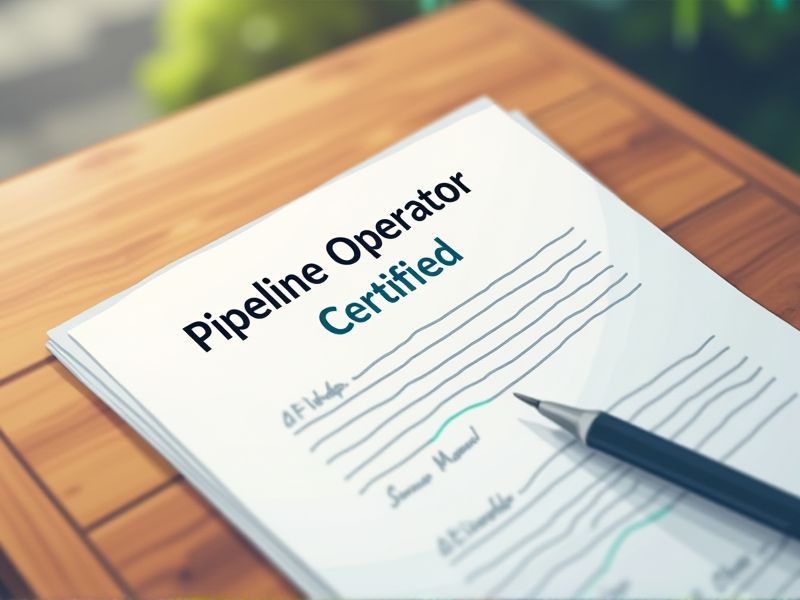
Pipeline operators are tasked with overseeing critical infrastructure that requires precision, safety, and compliance with regulatory standards. Mismanagement or errors can lead to significant environmental damage, safety hazards, and financial loss. Certain certifications provide assurance that operators possess the necessary technical knowledge and adhere to industry best practices. Important certifications required for a pipeline operator include those for specific technical skills and regulatory compliance.
PHMSA Pipeline Operator Certification
The PHMSA Pipeline Operator Certification ensures that pipeline operators possess the necessary skills and knowledge to safely manage and operate pipeline systems. This certification aligns operators with federal safety standards, minimizing risks of incidents and environmental hazards. Pipeline integrity and community safety are greatly enhanced when operators demonstrate compliance with PHMSA regulations. Certification provides accountability and standardization across the industry, which improves public trust and operational efficiency.
API 1169 Pipeline Construction Inspector Certification
API 1169 Pipeline Construction Inspector Certification ensures a Pipeline Operator possesses standardized knowledge for inspecting construction activities in the pipeline industry. Certification helps mitigate construction errors and adherence to safety protocols. It bolsters industry credibility, meeting regulatory compliance and enhancing operational safety. Quality inspection through certified personnel reduces risks of environmental and operational incidents.
API 570 Piping Inspector Certification
API 570 Piping Inspector Certification ensures thorough understanding of inspection standards, which enhances pipeline safety and reliability. It provides pipeline operators with the skills to identify and mitigate potential defects and corrosion issues effectively. This certification aligns operators with industry best practices, ensuring compliance with regulatory requirements. Improving inspection proficiency leads to reduced downtime and maintenance costs, directly impacting operational efficiency.
API 653 Aboveground Storage Tank Inspector Certification
Possessing the API 653 certification indicates a comprehensive understanding of inspection, repair, alteration, and reconstruction of aboveground storage tanks, which align with the maintenance needs of pipeline operators. Pipeline operators encountering storage tanks in their operations face potential safety and environmental risks, thus the certification ensures they maintain tanks according to industry standards. The certification demonstrates the operator's ability to identify and rectify tank issues, minimizing downtime and preventing costly incidents. Having this credential enhances an operator's credibility and can improve compliance with regulatory requirements, thus facilitating more reliable and smooth pipeline operations.
NACE Cathodic Protection Technician Certification
Pipeline operators often work with infrastructure susceptible to corrosion, and a NACE Cathodic Protection Technician Certification provides specialized knowledge to prevent this issue. Corrosion can lead to pipeline failures, causing environmental hazards and costly repairs, which the certification helps mitigate. The certification ensures operators are equipped with the latest techniques and industry standards for prolonging pipeline integrity. As regulatory requirements for pipeline maintenance become more stringent, certified technicians demonstrate compliance, reducing legal and operational risks.
NACE Coating Inspector Certification
Pipeline operators must ensure the longevity and integrity of the infrastructure they manage; the NACE Coating Inspector Certification equips them with specialized knowledge to assess and maintain coating systems effectively. Damage or failure of pipeline coatings can lead to leaks or catastrophic failures, so certified inspectors play a crucial role in hazard prevention. Regulatory bodies often mandate strict coating standards, and possessing NACE certification signifies compliance with these requirements. Having certified personnel reduces maintenance costs and operational downtime by ensuring that coatings are applied and inspected to the highest standards.
OSHA 30-Hour General Industry Safety Certification
The OSHA 30-Hour General Industry Safety Certification equips pipeline operators with comprehensive knowledge of potential workplace hazards, enhancing safety compliance. This certification helps reduce the risk of accidents, subsequently lowering injury rates and associated costs. Understanding OSHA guidelines fosters a safety culture, promoting better communication among team members. Certification demonstrates a commitment to safety, which could improve trust and credibility with stakeholders.
HAZWOPER Certification
Pipeline operators frequently handle hazardous materials inherent in the transport of oil and gas. The HAZWOPER certification ensures they understand and can implement safety procedures to prevent accidents. In the event of a spill or leak, operators with this certification can efficiently manage and mitigate environmental damage. Consequently, regulatory bodies and employers emphasize this training to uphold safety standards and compliance.
First Aid/CPR Certification
First aid/CPR certification equips pipeline operators with essential skills to handle on-site medical emergencies, reducing injury severity. Pipeline operations are often remote and hazardous, so immediate knowledge of CPR can be crucial during critical incidents. Certification training enhances safety protocols, promoting a culture of health awareness within the team. Regulatory bodies often require such certification, ensuring compliance with industry safety standards.
Pipeline Integrity Management Certification
Pipeline Integrity Management Certification is crucial as it ensures operators are equipped to maintain the safety and efficiency of pipelines, minimizing the risks of leaks or ruptures. This certification provides operators with the latest industry standards and best practices, reinforcing their ability to make informed decisions. Regulatory environments often mandate such certifications to ensure compliance and avoid penalties. Continuous education through certification helps operators adapt to new technologies and evolving environmental concerns.
Summary
By obtaining certifications as a Pipeline Operator, you enhance your skill set, increasing employability and providing a competitive edge in the job market. This certification validates your knowledge and adherence to industry standards, resulting in improved job performance and safety compliance. Companies benefit as certified operators often reduce operational risks and enhance efficiency. The industry as a whole may experience elevated standards and practices, fostering a safer and more productive working environment.
